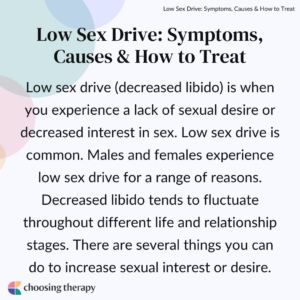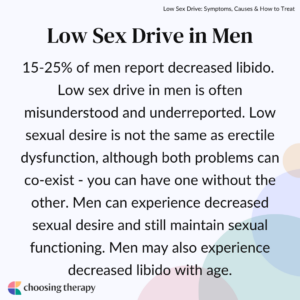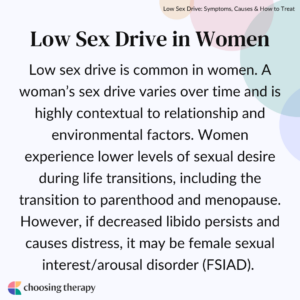Low sex drive (decreased libido) is when you experience a lack of sexual desire or decreased interest in sex. Low sex drive is common. Males and females experience low sex drive for a range of reasons. Decreased libido tends to fluctuate throughout different life and relationship stages. There are several things you can do to increase sexual interest or desire.
Sex & Intimacy Counseling for Couples Receive online counseling in a safe, unbiased space from a licensed therapist. No need to go to an office. Visit Talkspace
What Is Low Sex Drive?
Although low sex drive is common, if you have experienced decreased libido for more than 6 months and it’s causing you distress or impacting your relationship, it may be Female Sexual Interest/Arousal Disorder or Hypoactive Sexual Desire Disorder. If you want to improve your lack of sexual desire, your primary care physician can discuss the range of treatments available.
Low Sex Drive in Men
15-25% of men report decreased libido.1 Low sex drive in men is often misunderstood and underreported. Low sexual desire is not the same as erectile dysfunction, although both problems can co-exist – you can have one without the other. Men can experience decreased sexual desire and still maintain sexual functioning. Men may also experience decreased libido with age.
Low Sex Drive in Women
Low sex drive is common in women. A woman’s sex drive varies over time and is highly contextual to relationship and environmental factors. Women experience lower levels of sexual desire during life transitions, including the transition to parenthood and menopause.2,3 However, if decreased libido persists and causes distress, it may be female sexual interest/arousal disorder (FSIAD).
Causes of Low Sex Drive in Men & Women
Low sex drive can be caused by several factors, including life stressors, hormonal changes, relationship difficulties, chronic diseases, mental health, medications, as well as a range of lifestyle factors.4,5 The causes of decreased libido will be different for each person and may change over time.
The best practice supports a biopsychosocial and interpersonal approach to low sex drive, which simply means low sexual desire is rarely caused or maintained by one thing. As such, improving sexual desire may require addressing several factors, such as biological factors (e.g., hormones), psychological factors (e.g., depression treatment), social factors (e.g., gender stereotypes), as well as interpersonal factors (e.g., relationship communication).
Causes of Low Sex Drive in Men
Causes of low sex drive in men include a range of biological, psychological, social, and relationship factors. Low sexual desire or having no sex drive may be impacted by depression, anxiety, physical health, and medications.6 Decreased libido may also present alongside other sexual difficulties, such as erectile dysfunction and premature ejaculation.6
The relationship setting is important. Feelings of resentment and anger towards a partner can result in a loss of desire in the relational context, however, men may still maintain sexual interest in other sexual outlets.6 Men’s low sex drive is also impacted by a range of societal factors, such as sexual scripts of masculinity and gender roles.6
Physical causes of low sex drive in men may include:
- Low testosterone: Testosterone levels decrease with age but can also occur in younger men from high blood pressure, heart disease, type 2 diabetes, and other conditions.7 Low testosterone has been associated with low sexual desire in men.6
- Endocrine disorders: Endocrine disorders, including hypothyroidism, hyperprolactinemia (excessive levels of prolactin), and hypogonadism (low levels of testosterone) may be associated with low male sexual desire.6
- Health and mental health: Decreased libido in men has been associated with cardiovascular disease, cancer, depression, and anxiety either directly or indirectly.6
- Medication side effects: Male sexual dysfunction may be associated with a number of medications, including antidepressants, anticonvulsants, antipsychotics, beta blockers, and benzodiazepines.6 See your medical professional for specific advice. Do not stop taking medication without medical consultation.
- Chronic illness: Chronic illnesses such as diabetes, arthritis, cancer, fibromyalgia, heart disease, and kidney failure may also be associated with male sexual desire, either directly or indirectly.6
- Sexual difficulties: Low sex drive may present alongside other sexual difficulties, such as erectile dysfunction and premature ejaculation. In heterosexual relationships, low sex drive in men is also associated with partner sexual difficulties.6
Causes of Low Sex Drive in Women
Low sex drive in women is highly contextual and influenced by their relationship. Risk factors for decreased libido in women also include a range of biological, psychological, and social and factors. It’s important to remember that often low sexual desire occurs in the context of an interplay between multiple factors that impact on each other.
Physical causes of low sex drive in women may include:
- Surgery: Research suggests low sex drive in women is associated with vascular, neurologic, and pelvic radiation or surgery.8
- Health Conditions: Low sex drive in women is associated with hypertension, metabolic syndrome, hyperlipidemia, obesity, breast cancer, coronary artery disease, and disorders that can adversely affect the central nervous system and peripheral nervous system, such as diabetes and multiple sclerosis.5,8,9
- Biological changes: Serotonin has been associated with inhibited sexual desire. Dopamine (CNS neurotransmitter) blockers such as antipsychotics have also been linked to low sex drive.8
- Sexual problems: Low sex drive may co-occur with other sexual difficulties, such as pain during sex or inability to orgasm.8
- Fatigue and stress: Caring for young children or family members or being tired from illness may contribute to low sex drive.
- Medication side effects: Low sexual desire is a commonly reported side effect of a range of medications, including antihypertensives, anticonvulsants, and anti-depressants.8 However, research identifying the full spectrum of medications is limited, so if you think medication may be contributing to loss of libido or you are experiencing no sex drive whatsoever, seek advice from your doctor.8
See your medical professional for specific advice. Do not stop taking medication without medical consultation. - Hormones: Life transitions and the associated hormone changes in women, such as pregnancy, breastfeeding, and menopause, have been associated with a lack of libido or lost sex drive.2,3
Top Rated Online Therapy Services BetterHelp – Best Overall “BetterHelp is an online therapy platform that quickly connects you with a licensed counselor or therapist and earned 4 out of 5 stars.” Visit BetterHelp Talkspace – Sex & Intimacy Counseling for Couples Get closer to your partner with private and convenient counseling, from the comfort of your home. Visit Talkspace
Psychological Causes of Low Sex Drive
In the late 1970s, Kapalan and Lief added sexual desire to the human response cycle, originally proposed by Masters and Johnson.1 Since then, there has been growing recognition that sexual desire is more than just a prerequisite for sexual functioning, rather, low sex drive is a complex phenomenon impacted by a range of psychological factors.1
Psychological causes of decreased libido affect men and women and may include:
- Stress and sleep disorders: The impact of sleep on mental health has long been recognized. Stress and lack of sleep can have both a direct and indirect impact on low sexual desire.
- Untreated anxiety: The way anxiety impacts low sex drive is multi-layered. The symptoms of anxiety and associated medications may directly impact sexual desire. Also, even where anxiety wasn’t previously present, men and women can develop worries and insecurities about themselves and their relationships that further perpetuate decreased libido.
- Depression: For both men and women, depression and sex are linked in a number of different ways. For example, symptoms of depression such as fatigue and poor sleep may result in no sex drive or low libido. Negative thinking styles associated with depression may impact self-confidence and in turn, lead to low sexual desire.
- Relationship issues or feeling a lack of connection with a partner: Sexual desire is impacted by a lack of emotional intimacy in relationships. Low emotional intimacy and communication can impact on feelings of trust and safety essential to relationship satisfaction and sexual desire.
- Stress: There are many different types of stress that can contribute to low sex drive. For example, chronic stress associated with a challenging job may impact an individual’s mood, in turn affecting desire.
- Self-esteem: For both men and women, low self-esteem can contribute to low sex drive.
- History of physical or sexual abuse: For both men and women, sexual trauma or abuse can contribute to low sex drive. Trauma is complex, and for some people, the impacts of early trauma can present later in life. As such, it may not be initially clear that past trauma is contributing to your decreased libido.
- Expectations: Expectations can have a significant impact on our sexual satisfaction. Communication is important in relationships to address misconceptions and expectations and positively impact on sexual desire.
Lifestyle Causes of Low Sex Drive
Lifestyle and certain habits may contribute to low sex drive for both men and women. Whilst research is limited on lifestyle factors and low sex drive specifically, research does indicate an association between sexual dysfunction and lifestyle factors in men and women.5
Lifestyle factors such as physical activity and a healthy diet have been associated with a lower risk of female sexual dysfunction.5 Research supports that there is a connection between erectile dysfunction and a range of lifestyle factors, including cigarette smoking, alcohol intake, physical activity, and healthy diet.5
Coping with Low Libido Challenges
Although low libido may be experienced by one partner, if they are in a relationship, it is essential to consider the relational context. One of the fundamental challenges contributing to couple distress is the discrepancy in levels of sexual desire. Neither the partner with a higher desire for sex nor the partner with a lower desire for sex is the “problem.”
The problem lies in the difference in desire, and that can only be addressed by working with both partners. Couples therapy and relationship support can be helpful in overcoming the challenges desire discrepancy presents in a relationship.
It is important to note that if you feel your partner is not respectful of your sexual health needs or if your partner’s behaviors are abusive, you should seek individual support. In these instances, couples therapy is not recommended, and it is best to seek out an individual psychologist and reach out to domestic violence services.
Sex & Intimacy Counseling for Couples Receive online counseling in a safe, unbiased space from a licensed therapist. No need to go to an office. Visit Talkspace
Treatment Options
It’s important to discuss your sexual health concerns with your primary care physician to rule out any underlying physical or medical causes of your low sex drive. If you’re not comfortable talking to your regular doctor, seek out a doctor with a particular interest in sexual health who can guide the conversation and suggest appropriate pathways for treatment.
The best treatment for low sex drive will address both the underlying causes and the factors that are maintaining decreased libido. For example, if a low mood is decreasing your libido, then treating the depression is important. If your decreased sex drive has impacted on connection in your relationship, then seeing a couples therapist to improve communication will be helpful.
Common treatments to improve your sex drive include:
- Sex therapy: It may be helpful to see a sexologist if you would like to identify ways to improve your experience of low sex drive. A sexologist can help you identify the causes of your low desire and help to make changes to improve your libido.
- Couples therapy: Couples therapy may be helpful in addressing a range of issues that could be contributing to low sexual desire. Even where there are no relationship difficulties, couples therapy may be helpful in enhancing communication, addressing desire discrepancies, and managing expectations.
- Individual therapy: Research supports that individual therapy has a positive impact on improving sexual satisfaction.10 Sexual health is a specialist area of knowledge – choose a therapist who has experience in this area, as well as training in your other areas of need, e.g., mental health.
- Medication changes: There are medications that may be relevant to the treatment of low sex drive, whether that be to directly treat desire, the medical or mental health conditions impacting low sex drive, or the medication side effects contributing to decreased libido. Depending on your individual situation, your doctor may be able to prescribe psychopharmacological treatment or offer an alternative medication.13
- Hormone therapy: Depending on your individual situation (e.g., menopause), there may be hormone therapy that can improve low sex drive.12 Testosterone therapy may also improve libido in men with low testosterone levels.13
- Lifestyle changes: Addressing lifestyle factors may have positive impacts on your sexual desire and functioning. For women, physical activity and a healthy diet are important for sexual functioning. Whereas for men, cigarette smoking, alcohol intake, physical activity, and a healthy diet are all important factors in sexual health.
- Improving sleep: Sleep can have an enormous impact on our wellbeing, mental health, and physical wellbeing, resulting in low sex drive.
In My Experience
In my experience as a clinical psychologist and couple therapist, low sex drive is incredibly common in both men and women. Unfortunately, decreased libido is often misunderstood and underreported, meaning many people don’t access the help that is readily available.
Most people will experience periods of low sexual desire at some stage in their life. Decreased libido is highly contextual and may self-resolve as factors in your life change (e.g., life stressors, becoming a new parent). However, if low sex drive persists or is causing you distress, it is important to seek help, there are a range of treatments available.
Whether the source of low libido is directly impacted by aspects of your relationship or not, talking with your partner (in a healthy, supportive relationship) is essential to improving your situation. Couples therapy or seeing a sexologist is often recommended (even where the source of decreased libido is medical), because low sex drive occurs in a relational context.
Don’t lose hope. Low sex drive is treatable. In my clinical experience, I’ve found over the course of a couples retreat, issues with sexual desire often self-resolve as the couple commits the necessary time and space to address the underlying factors such as reducing stress, improving communication, addressing expectations, and enhancing emotional intimacy.
Remember, there is no such thing as a “normal sex life”, there is only your sex life and what makes you and your partner happy. However, if decreased libido is causing you or your partner distress, rest assured help is available. Book an appointment with a health professional. After understanding your situation, they can provide you with the best treatment options.
To help our readers take the next step in their mental health journey, Choosing Therapy has partnered with leaders in mental health and wellness. Choosing Therapy is compensated for marketing by the companies included below Sex & Intimacy Counseling for Couples Get closer to your partner with private and convenient counseling, from the comfort of your home. Visit Talkspace Sexual Healthcare For Men Get ED meds online shipped to you if prescribed. FDA-approved ED pills, with treatments starting at less than $2/day. 100% online, discreet delivery. No waiting weeks for an appointment. Visit Hims Sexual Healthcare For Women Plushcare – Get personalized, high-quality healthcare online. In-network with most major insurers, with a typical out-of-pocket cost of just $30. Painful Sex Treatment and HSDD (low sex drive in women)Additional Resources
For Further Reading
You can find information on a range of sexual health topics on the International Society for Sexual Medicine’s website https://www.issm.info/public
Best Online Therapy Services There are a number of factors to consider when trying to determine which online therapy platform is going to be the best fit for you. It’s important to be mindful of what each platform costs, the services they provide you with, their providers’ training and level of expertise, and several other important criteria.
Best Online Psychiatry Services Online psychiatry, sometimes called telepsychiatry, platforms offer medication management by phone, video, or secure messaging for a variety of mental health conditions. In some cases, online psychiatry may be more affordable than seeing an in-person provider. Mental health treatment has expanded to include many online psychiatry and therapy services. With so many choices, it can feel overwhelming to find the one that is right for you.








